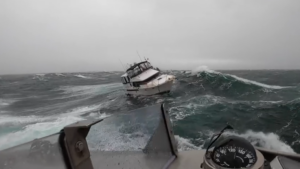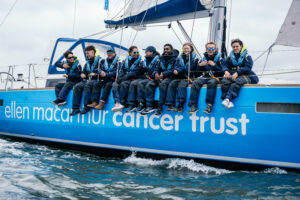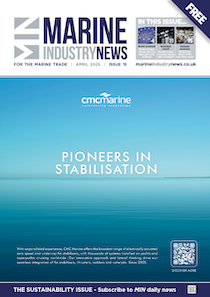‘I am in shock’: Vendée Globe skipper dropped by sponsor after having baby
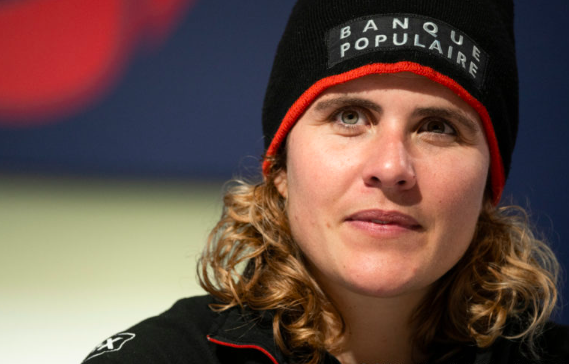 Vendée Globe competitor Clarisse Crémer. Image courtesy of Olivier Blanchet/Alea #VG2020
Vendée Globe competitor Clarisse Crémer. Image courtesy of Olivier Blanchet/Alea #VG2020
Clarisse Crémer, the Vendée Globe competitor who came 12th overall in 2020/2021, and was the first woman to complete that iteration and became a record holder in the process, has been dropped by her sponsor Banque Populaire.
And now, a blame game is taking place on social media as both organisations, the bank and the race officials, feel the fury of their publics — not least because this is 2023 and Crémer has been dropped because . . . she had a baby.
Unlike tennis, which changed in rules in 2019 so a player’s ranking freezes in the event of pregnancy (with that special ranking in place for three years) and triathletes (fixed ranking for duration of pregnancy) and dressage (fifty per cent of ranking) and more sports, the organisers of the Vendée Globe have been caught short by Crémer, her skill and popularity, and its own web of rules which do not take into account that female athletes give birth.
It appears that the offshore racing ecosystem has proved incapable of anticipating this situation, says Voile & Moteur.
In October 2021, new rules were implemented to qualify for the Vendée Globe. Until then, finishers were automatically qualified for the next edition. But now skippers must gain points by participating in intermediate races and only the first 40 qualify. Crémer’s maternity leaves means she couldn’t rack up enough points.
Banque Populaire “forced” into its stance
Banque Populaire says it has been “forced to change skipper” and drop Crémer. It explains its decision thus:
“In October 2021, the organiser of the world tour announced a new, unprecedented method of qualification no longer allowing finishers to be directly qualified for the next edition.
“It established a system for accumulating points to be acquired between winter 2021 and summer 2024 by participating in races on the circuit for the allocation of 40 places in the event (including a wildcard).
“To comply with these new regulations, Team Banque Populaire has rented a boat in order to participate in the races of the 2022 season and thus give itself every chance with Clarisse of scoring the necessary points while awaiting the delivery of the Banque Populaire XII monohull in December 2022 (formerly Apivia).
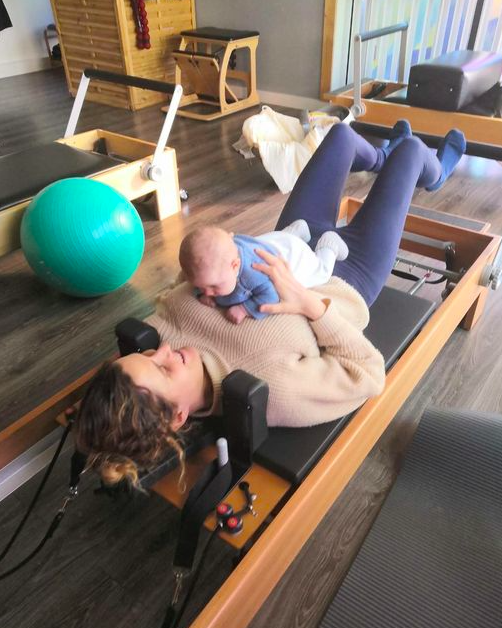
“Having been unable to participate in these races for fortunate reasons of maternity, Clarisse (pictured left, with her baby) is today in a situation which does not allow her to hope to obtain the number of points necessary to qualify for the Vendée Globe 2024.”
The bank says it has proposed several solutions to the Vendee organisers “so that the regulations take into account the situation of women in the Vendée Globe and the question of maternity.
Vendée Globe rejects all proposals
“All these proposals, as well as requests for the allocation of a wildcard guarantee, have been rejected, including the one made just a few days ago, and this is regrettable.” So, it’s dumped her and is looking for a new skipper.
Meanwhile, Vendée Globe organisers are at pains to talk about preserving fairness for all the potential competitors and say “the race organisation cannot under any circumstances allow itself to change the rules, when the selection process has already begun.”
It says a wild card possibility cannot be decided until the end of the selection process, as the organisation does not know which skippers could be eligible. “We should add at this stage, no skipper is guaranteed to take pat in the next Vendée Globe.”
Crémer is obviously devastated that her sponsor has deserted her, and that the contest is not geared toward supporting female athletes — even though the last edition’s diversity was celebrated.
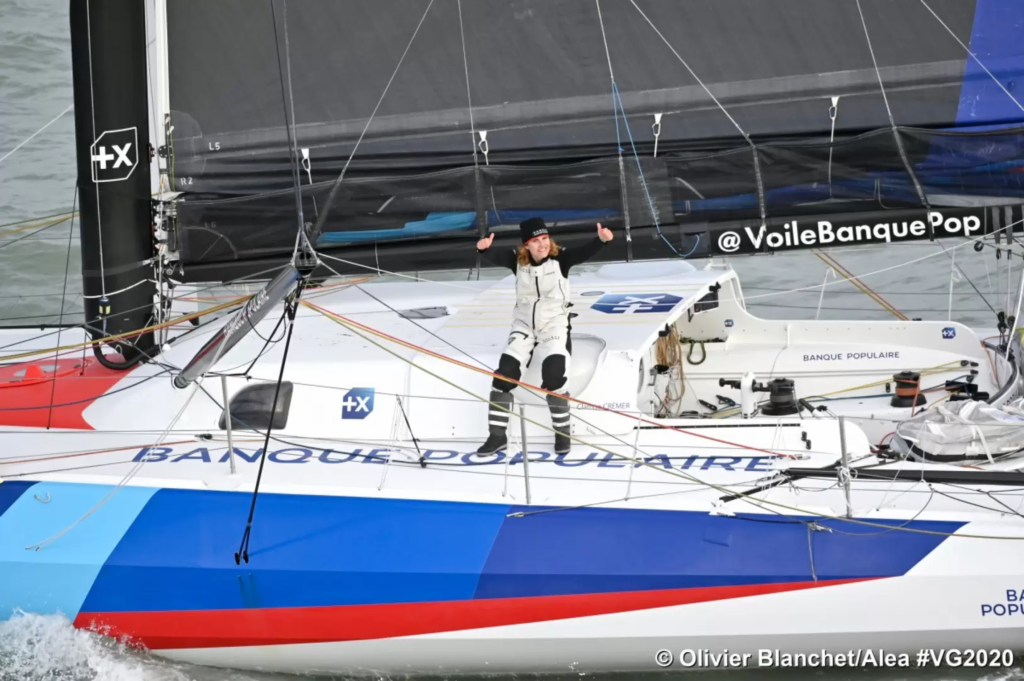
“The rules of a competition are supposed to ensure fairness and sportsmanship. Today, the rules chosen by the Vendée Globe prohibit a woman from having a child, even though she would be a well-known athlete, already finishing the previous edition. In the 21st century, who do we want to believe that such rules would be fair?” says Crémer.
“Vendée Globe rules for the 2024 edition require all skippers to compete based on race miles. On this note, I of course fell behind the other competitors at the start, this maternity left me out of qualifying for a year.
“Today Banque Populaire decides that it represents for them a ‘risk’ that they ultimately do not want to take.
“I am in shock, other projects launched much more recently, however, continue without flinching. There were two full seasons and four transatlantic races left to get back to the level, I was fully equipped to finish my rehabilitation as soon as possible.
“For Banque Populaire it would be “let fate choose in their place”, while they “must” be at the start of the Vendée Globe. They’re willing to take on the risk of a giant trimaran, and all the natural, technical and human hazards of racing offshore, but obviously not motherhood.”
In a letter sent to Clarisse Crémer in October 2022, the Vendée Globe president expressed his wish to see her on the start line on 10 November 2024. “I reiterate my wish that a sponsor will be able to join her in this wonderful adventure,” reaffirmed Alain Leboeuf, last week.
Meanwhile, the bank is keen to point out that this situation “should make it possible to open up the subject of women and motherhood in sailing more widely.”
It says it is “committed to the values of diversity and equal opportunity and is determined to participate in the work necessary with the various players to help it progress.”
That’s not cutting it with the wider sailing community though who are appalled at the decision and the inflexibility of the Vendée Globe organisers and the fact that, in 2023, the subject of motherhood needs to be ‘opened up’.
Pip Hare speaks out
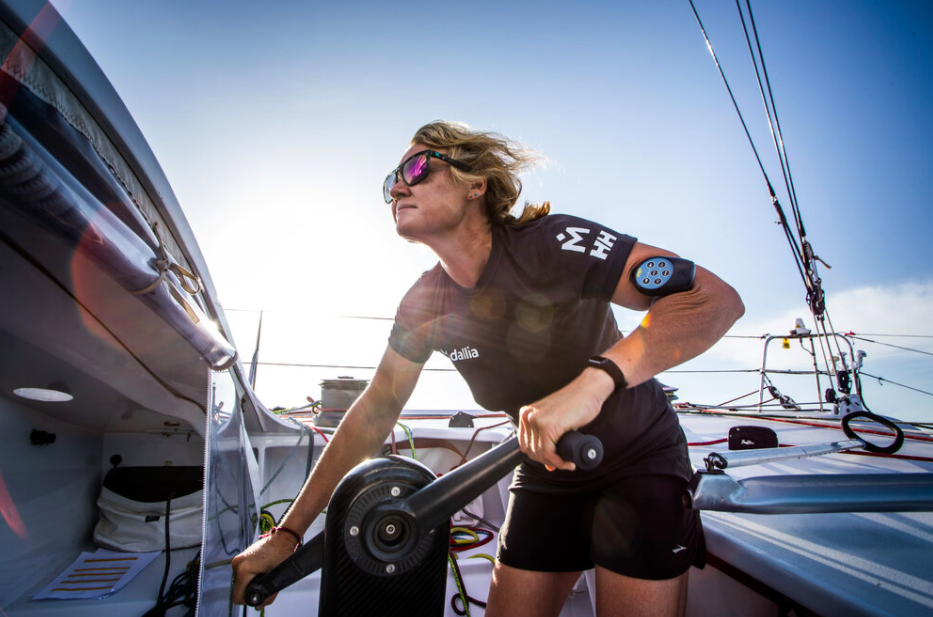
“I’m shocked and ashamed at the treatment of Clarisse after the news that she’s been dropped by her team. In the last edition of the Vendée Globe we had the highest number of female competitors and now, just two years on, we have a situation where the qualifying criteria mean that a woman on maternity leave is seen as too much of a risk as a skipper who can qualify for the race,” says British sailor and Vendée competitor, Pip Hare (pictured left).
“I’m pleased that my fellow skippers and the IMOCA class are taking this situation very seriously. I love this sport because men and women compete on equal terms, but that seems not to be the case any more. I thought we’d made such progress as female sailors – as female athletes in general – to gain acceptance, compete on equal terms and take our place at the top of leadership boards. I was wrong – we have so much more to do. And Clarisse’s case will just spur us on.”
Marie Tabarly, athlete and captain of a 22 metre yacht with a crew of 25, says “It’s 2023, and there are still partners who dare to say: ‘Engaged in the sport for 34 years, our company is committed to the values of diversity and equality of opportunity and is determined to participate in the necessary work with the various stakeholders to do so’.
“Mwah… ‘Do what I say, not what I do’.
“Sponsors, businesses, if you’re really about this fight, then you’re one with your athlete. You stand with him, you get him, you support him, you support his cause.
“Quit taking a risk and missing out on a Vendée Globe edition (there are so many other races on the globe, is it that bad?) is a story you live together. Take a step back, the world of sailing doesn’t only revolve around the Vendée Globe… And then usually the winner of the Vendée Globe is rarely the only winner of the Vendée Globe, all the participants are heroes.”
Sam Davies is saddened by decision
Sam Davies (pictured below), British sailor and Vendée competitor, recognises that Crémer’s career is destroyed by the decision. “I am so sad that we haven’t reacted soon enough to prevent this terrible decision,” she says.
“It shouldn’t have to be that someone has their career/dream destroyed to make people wake up and make changes.”
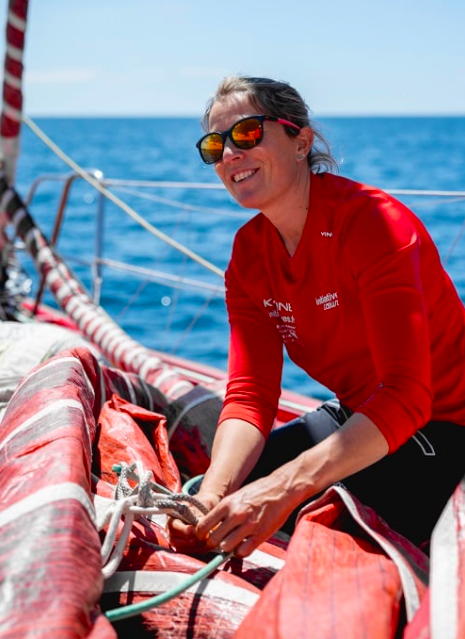
In 2022, Davies and Crémer were interviewed about sailing and motherhood.
At the time, Davies said: “We’re still pioneers, for me it was perhaps a little more difficult ten years ago but I hope that for Clarisse it will be simpler.”
Crémer pointed out that she was at the very beginning of her pregnancy story but that she was telling herself that it was possible, with Sam’s example to follow.
She felt that it wasn’t a trivial situation for her sponsors, with projects running up to four years but that “in the end, it’s like having a big accident, you disappear for a while, then once cured you come back, so I don’t think they need to be reassured, it’s just that concretely, depending how the project is going, it’s more or less easy to manage.”
In the same interview, Davies mentioned that the challenges of taking a break include “technology advances, manoeuvres evolve, you lose your physique, so it’s much harder to take a break than to have a child while you continue to carry out the project. Clarisse is lucky on that side because she will be able to optimise everything to be able to come back as soon as possible.” Except, without a sponsor she won’t.
Petition to show support
An online petition has been started to show “support for Clarisse above all, but also let’s show Banque Populaire that women have the right to be top athletes, that they have the right to live their maternity without being worried.
“Instead of accompanying her in her admirable approach to motherhood, Banque Populaire prefers to sanction her by replacing her with another skipper, on the pretext that they “must be at the start of the Vendée Globe 2024.”
What does the sailing community think?
In March 2021, MIN called out the Vendée Globe on International Women’s Day, specifically the organisation’s continued insistence on describing Clarisse Crémer as having a ‘radiant smile’, or a ‘big smile’ or a ‘bubbly, charismatic personality’ in its communications while – with distinct unfairness in MIN’s opinion – not mentioning the toothy wholesomeness of some of the male competitors.
Kojiro Shiraishi was referred to as ‘dignified’ and Alex Thomson as ‘brisk and business-like’ while female sailors were pre-faced with their attractive qualities like ‘smiling’ and ‘radiant’ Sam Davies.
But now both the race organisers and the bank are in the spotlight.
“The press release was brutal – misogyny hiding behind rules.. cold-hearted legalese at its worst,” says one.
Online commentators have called the bank’s statement “a last stinking chapter of hypocrisy” and told the bank to “Stop putting the blame on others, it sucks, pathetic. Because y’all are just as guilty as the other. The Globe Vendée with its change of rules, and you with your choice.”
Among the hundreds of comments dedicated to the entreched position of Vendée Globe, one asks: “Is it 2023?? Oh no sorry sorry …… I think it’s 1970 or 1980 at the Vendée Globe!! At a time when motherhood, children… Had to hide them under the rug… Not calculating a ratio of miles to drive into maternity leave is just unfair to women!!”
“Your lack of creativity and imagination (or enterprise spirit) to find a solution to Clarisse Crémer’s case demonstrates how TOTALLY inadequate your organisation is with society,” says another.
There are comments about how this will push refinement of regulations.
“This will make you think and evolve this regulation. It’s good to report injustice and look for a constructive solution. .. . The clean of life and of our societies is to adapt to the challenges that are presented to it. The rules will evolve and the situation will get back to normal. The attitude of the sponsor Vendée Globe is infinitely more shocking than that of the organization Voile Banque Populaire which finds itself caught in a storm it neither wanted nor caused.”
But, whether the regulations evolve or not, at what cost is this to Crémer, the sport, its image, the reputation of the organisers and the attitudes of sponsors? Hands have been shown.
“I want to thank the people who have supported me and will recognise themselves. I am determined to sail again, under the colours of a trusted partner with whom I will share human convictions. My passion for sailing remains intact, and I will quickly overcome the disappointment I live today,” says Crémer.
“Thinking especially of all women, athletes and others, who go through similar struggles without having this opportunity to speak. What does equality mean to women? To behave just like men and therefore especially not to be pregnant? If I speak out today, it is not out of revenge, to gain attention or to complain, but to provoke thought, and in hopes of advancing our society.”


